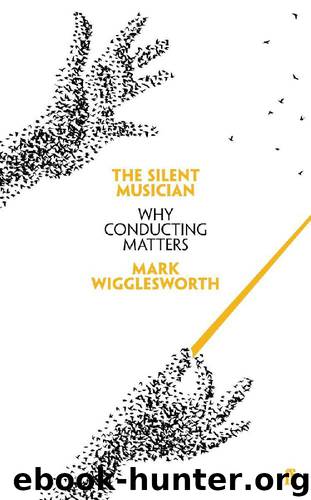The Silent Musician: Why Conducting Matters by Mark Wigglesworth

Author:Mark Wigglesworth [Wigglesworth, Mark]
Language: eng
Format: epub
ISBN: 9780571337927
Publisher: Faber & Faber
Published: 2018-10-02T04:00:00+00:00
The best performances reveal a score’s details without losing perspective on the overarching narrative of the piece. It is easy to mistake the wood for the trees but as long as the details serve the whole, it is possible to value both. In more complicated pieces you can get bogged down by all the instructions the composer gives you. If you don’t dot an ‘i’ or cross a ‘t’, they can both look like an ‘l’, but, despite its value, due diligence mustn’t sound like a goal in itself. Pedantry can take you further away from the music rather than closer to it, and you can soon discover you are playing the information rather than using it. Although some people might be more interested in a lecture on heaven than heaven itself, I hope they are in the minority. Musical details are a means of expression rather than the expression itself. You have to think meaning not grammar – be like a chef who doesn’t want you to be able to taste any of the ingredients.
The inspiring French pedagogue Nadia Boulanger said that ‘to study music, we must learn the rules. To create music, we must break them … A great work is made out of a combination of obedience and liberty.’ She was talking more about composing but the philosophy of performing is similar. Great musicians are ruled not by the score but by their passion for it, a compulsion that is much easier to follow within the context of a live performance. This is not wilful individualism but a belief that music is a life-giving force that gets its oxygen from the ardency that feeds it. The discipline of the mind provides structure for the piece but it is the enthusiasm of the heart that creates the generosity of spirit audiences want to be part of. When Stravinsky said that it was more important to love a piece than to respect it, he was describing his view of the relationship between performers and composers. Love implies respect as well, but his point is that the connection should be more an emotional than an intellectual one. Most of the time we need a reverential humility in the face of works of art that are far more significant than we could ever be, but at the moment of the performance we are part of that work of art and must have a subjective attachment to it if we are to do it justice. Respect keeps its distance. Love gets involved. There is no denying which is more powerful.
It is said that wisdom is understanding how and when to use your knowledge. Excessive preparation is a waste of time if your knowledge simply functions as a cage that stifles spontaneity rather than as a climbing frame for creativity. Some believe that only in spontaneity can truth be found. I certainly think that musical instinct is just as powerful as knowledge – and even more so in the most intuitive musicians. A
Download
This site does not store any files on its server. We only index and link to content provided by other sites. Please contact the content providers to delete copyright contents if any and email us, we'll remove relevant links or contents immediately.
The Goal (Off-Campus #4) by Elle Kennedy(13643)
Kathy Andrews Collection by Kathy Andrews(11797)
Diary of a Player by Brad Paisley(7540)
Assassin’s Fate by Robin Hobb(6189)
What Does This Button Do? by Bruce Dickinson(6188)
Big Little Lies by Liane Moriarty(5773)
Altered Sensations by David Pantalony(5089)
Pale Blue Dot by Carl Sagan(4986)
Sticky Fingers by Joe Hagan(4176)
The Death of the Heart by Elizabeth Bowen(3596)
The Heroin Diaries by Nikki Sixx(3534)
Beneath These Shadows by Meghan March(3293)
Confessions of a Video Vixen by Karrine Steffans(3292)
How Music Works by David Byrne(3249)
The Help by Kathryn Stockett(3130)
Jam by Jam (epub)(3069)
Harry Potter 4 - Harry Potter and The Goblet of Fire by J.K.Rowling(3048)
Computational Linguistics and Intelligent Text Processing: 20th International Conference, CICLing 2019 La Rochelle, France, April 7â13, 2019 Revised Selected Papers, Part I by Alexander Gelbukh(2975)
Strange Fascination: David Bowie: The Definitive Story by David Buckley(2848)
